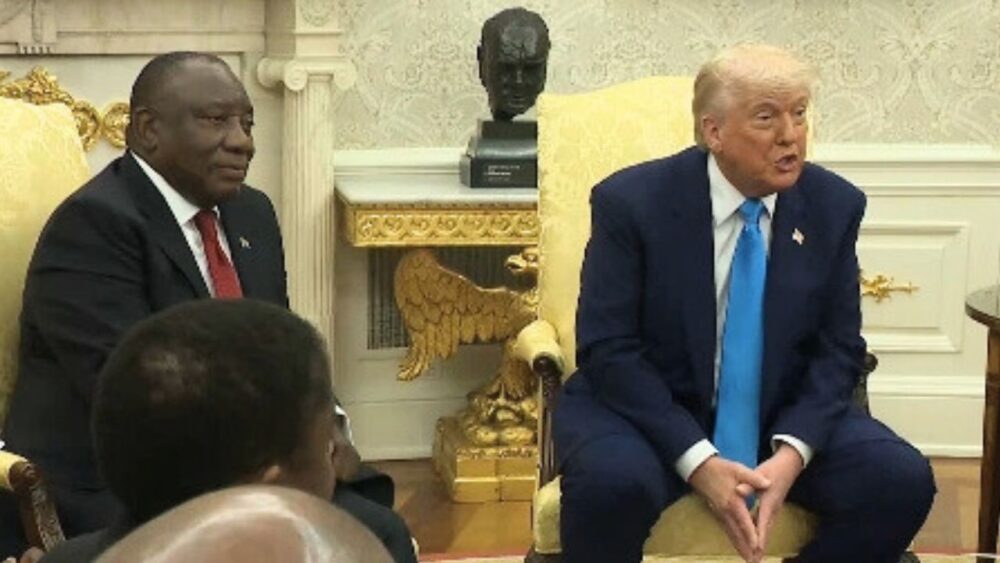During one of the most profound visits ever seen at the White House, President Donald Trump challenged South African President Cyril Ramaphosa on Wednesday with multiple videos that show the exact impact of violence against White South Africans.
59 Afrikaaners, a demographic Trump has previously described as under siege by discriminatory policies, let alone genocide, have recently fled to immigrate to America, as previously reported by The Dallas Express.
Evidential footage of the attacks against white Africans, shared during this week’s Oval Office exchange, showed hundreds of rows of crosses planted to memorialize murdered white farmers in Africa.
“So many crosses,” Elon Musk, a South African himself with farming ties, simply wrote in response to the shocking video.
So many crosses https://t.co/rTMTc2uGun
— Kekius Maximus (@elonmusk) March 8, 2025
Trump went on to remind the South African president that growing numbers of White citizens in his country are now seeking refuge in America.
South Africa’s government has, at many times, denied any allegations of racial persecution or genocide against whites, with Ramaphosa calling claims of genocide “sensationalism” and insisting his delegation, including his agriculture minister, does not agree with that narrative.
This was a narrative the South African officials seemed to carry into the Oval Office, most of whom were unwilling to look at the videos shown by Trump.
As the Oval Office conversation unfolded, Trump flipped through a thick stack of papers reflecting a tangible reminder of each murdered white South African.
Trump then handed the thick stack of papers to Ramaphosa during the meeting, yet the South African president did not look through one single page or personal photo of those who died during the broadcasted meeting.
Elon Musk was in attendance, and online videos showed him staring sternly at Ramaphosa.
It would make sense, as Musk’s family were also white farmers in South Africa, and Musk himself seemingly fled to America for opportunity—an opportunity that has proven him and his ventures in Texas specifically.
Africa has yet to quell the violence against white farmers, even before the storied days of Rhodesia, now Zimbabwe. Rhodesia once stood as one of the last shining examples of rugged determination and self-reliance, a bastion of Western values in the heart of Africa.
Founded by settlers who embodied a pioneering spirit, Rhodesia championed law and order while aiming to protect private property rights. A country that valued hard work and limited government interference, creating an environment where free enterprise could thrive against all odds, including the harsh heat.
The before and after pictures of Rhodesia versus 2025 Zimbabwe are shocking.
Political analyst Will Tanner explained it well in the following post:
Was Rhodesia a better place than Zimbabwe?
Yes, by every metric imaginable other than nominal dedication to egalitarianism
But, while obvious, it's worth exploring some of the many ways in which Rhodesia was a far better place for all involved, black and white alike
A 🧵👇 pic.twitter.com/a7x9dJnlND
— Will Tanner (@Will_Tanner_1) November 29, 2024
Rhodesia fell due to relentless attacks and murders of its hardworking white farmers in 1980, who were the backbone of its economy. Guerrilla groups like ZANU, backed by other small and generally unorganized communist agitators, waged a vicious campaign of violence and intimidation in the so-called Bush War, stomping out those property rights, let alone any law and order.
Additionally, weak-kneed international sanctions and other problems at the 1979 Lancaster House Agreement forced the Rhodesian government to surrender, paving the way for Mugabe’s Marxist Zimbabwe to seize all white-owned farms they wanted by murderous force and plunge the nation into chaos.
An era that many current Afrikaaners remember and hope never to see again.
Currently, South Africa’s president has left many questions unanswered, while Trump remains persistent in asking the difficult questions.


